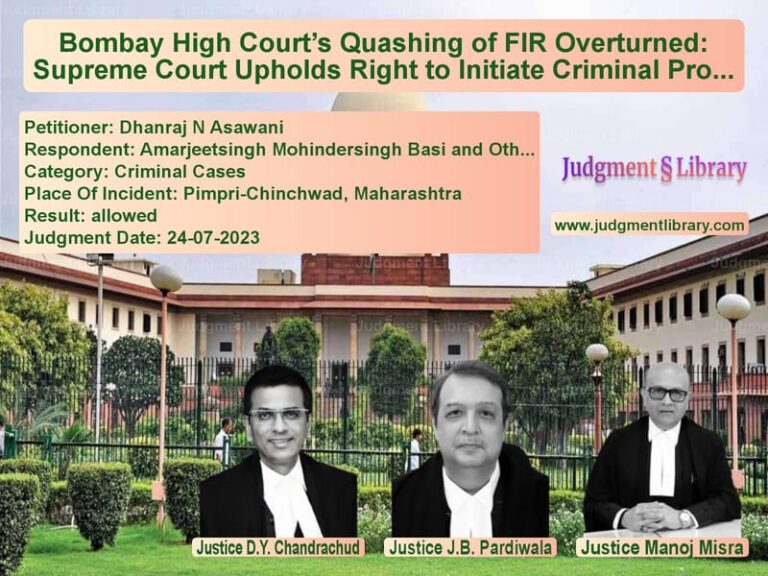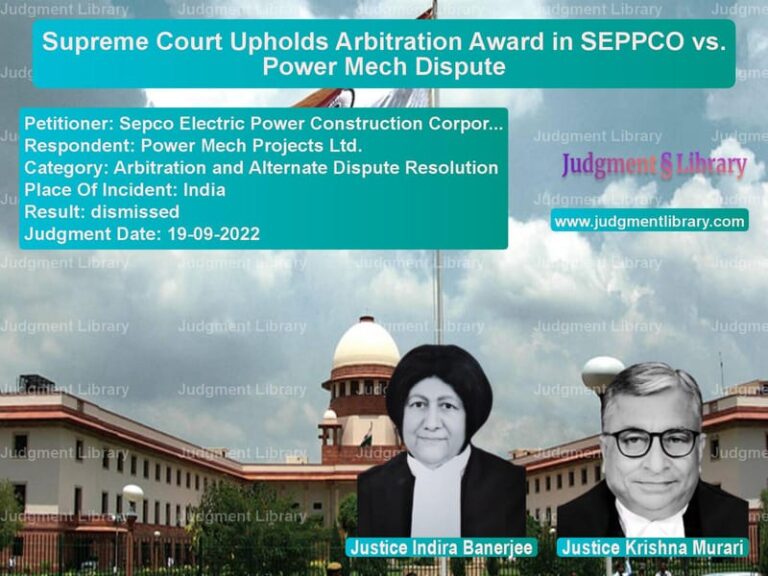Supreme Court Strikes Down Punjab High Court’s Order on Reservation in Medical Colleges
The Supreme Court of India has delivered a significant ruling in the case of The State of Punjab & Another vs. Anshika Goyal & Others, overturning a Punjab and Haryana High Court order that had directed the state government to provide a 1% reservation for children and grandchildren of terrorist-affected persons and Sikh riot-affected persons in all private unaided non-minority medical and dental institutions in Punjab. The ruling also quashed the High Court’s order to increase the sports quota from 1% to 3% in government medical and dental colleges.
Background of the Case
The State of Punjab enacted the Punjab Private Health Sciences Educational Institutions (Regulation of Admission, Fixation of Fee, and Making of Reservation) Act, 2006 (2006 Act) to regulate admissions and reservations in private medical and dental colleges. Section 6 of the Act empowered the state to provide reservations as notified from time to time.
In 2018, Punjab formulated a sports policy that provided a 3% reservation for sports persons in admissions to educational institutions, including medical and technical colleges. However, a government order issued on July 25, 2019, limited the sports quota to 1% in medical and dental colleges.
For the academic year 2018-19, the state government issued a notification on February 6, 2018, which provided 1% reservations for children/grandchildren of terrorist-affected persons and Sikh riot-affected persons in state quota seats of government medical and dental colleges, but no such reservation was provided for private institutions. A group of students challenged the notification before the Punjab and Haryana High Court, seeking extension of this reservation to private institutions.
The High Court, in its judgment dated July 26, 2019, and August 8, 2019, directed the Punjab government to issue a fresh notification extending the reservation to private institutions and increasing the sports quota in government medical and dental colleges from 1% to 3%. The state government challenged this decision in the Supreme Court.
Arguments by the Petitioner (State of Punjab)
- The state argued that Article 15(5) of the Constitution of India is an enabling provision, allowing but not mandating the government to provide reservations.
- It contended that courts cannot issue a writ of mandamus directing the state to provide reservations, as this is a matter of policy.
- The government stated that a conscious policy decision had been made to provide only 1% sports quota, and the High Court exceeded its jurisdiction by mandating an increase.
- The state relied on precedents such as Gulshan Prakash v. State of Haryana and Mukesh Kumar v. State of Uttarakhand to assert that the judiciary cannot compel the government to create reservations.
Arguments by the Respondents (Students)
- The respondents contended that since the state had already provided 1% reservations for these categories in government colleges, the same should be extended to private colleges.
- They argued that the sports policy of 2018 mandated a 3% reservation for sports persons, and the government had no valid reason to reduce it to 1% in medical and dental colleges.
- They maintained that the High Court’s directions were justified in ensuring uniformity and fairness in reservation policies.
Observations of the Supreme Court
The Supreme Court, comprising Justices M.R. Shah and B.V. Nagarathna, ruled that the High Court had exceeded its jurisdiction by issuing a writ of mandamus to the state government.
The Court observed:
“No writ of mandamus can be issued directing the State to provide for a particular percentage of reservation for a particular category of persons. Such a decision must be left to the wisdom of the State Government.”
Regarding the sports quota, the Court noted:
“The government took a conscious policy decision to provide 1% reservation for sports persons after considering the needs of the state. Courts cannot interfere in policy matters unless they violate constitutional rights.”
On reservations for children/grandchildren of terrorist-affected and Sikh riot-affected persons, the Court ruled:
“The issue has become academic since the state has already extended the reservations in subsequent years. However, we clarify that courts cannot direct the government to provide a specific reservation policy.”
Final Judgment
- The Supreme Court quashed the High Court’s order directing the Punjab government to issue a fresh notification providing a 1% reservation for children/grandchildren of terrorist-affected persons and Sikh riot-affected persons in private medical and dental institutions.
- The Court also set aside the High Court’s directive to increase the sports quota from 1% to 3% in government medical and dental colleges.
- It ruled that reservations in educational institutions are a policy matter and cannot be dictated by the judiciary.
Implications of the Judgment
- The ruling affirms that courts cannot mandate reservations or dictate the percentage of quotas to be provided by the government.
- It reinforces the principle that reservation policies are within the executive domain and must be framed based on socio-economic factors and administrative feasibility.
- The judgment provides clarity on the limits of judicial intervention in government policies, ensuring that courts do not encroach upon legislative and executive functions.
- The decision may impact future cases where courts are asked to direct governments to create or modify reservation policies.
Petitioner Name: The State of Punjab and Another.Respondent Name: Anshika Goyal and others.Judgment By: Justice M.R. Shah, Justice B.V. Nagarathna.Place Of Incident: Punjab.Judgment Date: 25-01-2022.
Don’t miss out on the full details! Download the complete judgment in PDF format below and gain valuable insights instantly!
Download Judgment: the-state-of-punjab-vs-anshika-goyal-and-ot-supreme-court-of-india-judgment-dated-25-01-2022.pdf
Directly Download Judgment: Directly download this Judgment
See all petitions in Fundamental Rights
See all petitions in Legislative Powers
See all petitions in Judgment by Mukeshkumar Rasikbhai Shah
See all petitions in Judgment by B.V. Nagarathna
See all petitions in allowed
See all petitions in Quashed
See all petitions in supreme court of India judgments January 2022
See all petitions in 2022 judgments
See all posts in Constitutional Cases Category
See all allowed petitions in Constitutional Cases Category
See all Dismissed petitions in Constitutional Cases Category
See all partially allowed petitions in Constitutional Cases Category







